Legislative Advocacy
CVEA representatives work closely with state and federal lawmakers to maintain good working relationships. We consistently review items of value or concern to our Cooperative, our members, and the entire electric utility industry. We act and speak on your behalf to help make necessary changes or ensure forthcoming changes have the best possible outcome.
Efforts include communications as necessary throughout the year, local meetings when representatives are in the CVEA service territory, attending state and federal Legislative fly-ins and other meetings, and in-person meetings with representatives and agency's in Juneau and Washington, D.C.
Legislative Efforts
To learn about CVEA, the priorities of the cooperative, issues facing the cooperative, and policy that CVEA supports, click the link to below to view the 2026 Legislative Brochure:
2026 Legislative Brochure
CEO Matthews Participated in the Alaska Power Association Federal Legislative Conference in Washington, D.C. - June 2025
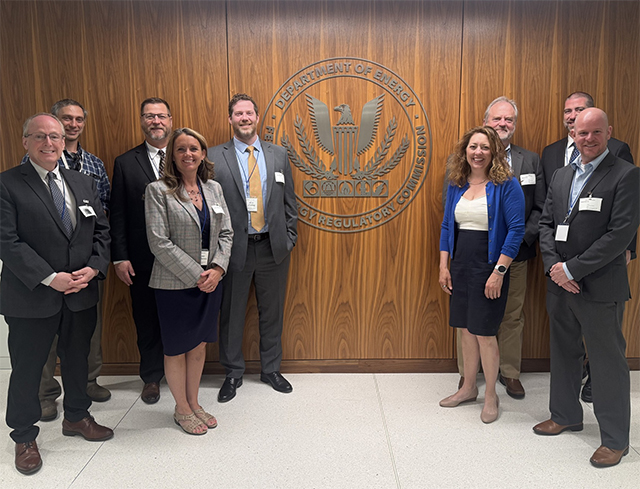
CEO Jaime Matthews travelled to Washington, D.C. the week of June 1, 2025, with eleven other industry professionals as part of the Alaska Power Association's (APA) Federal Legislative Conference where she advocated on behalf of CVEA members and had meaningful conversations about issues important for our region and state. According to Matthews, it was clear with all the visits, Alaska is a priority under the current administration; we are the only State to get our own Executive Order (EO). Many of the agencies are short staffed due to the early retirement packages but there is clear direction on less regulation, the need for speed in many government processes, and making sure the taxpayers’ money is spent responsibly.
Matthews provided a trip summary, outlining her key takeaways and a detailed trip report, written by APA's Deputy Director Mike Rovito.
CEO Matthews and Director Hess Visit Juneau - February 2025


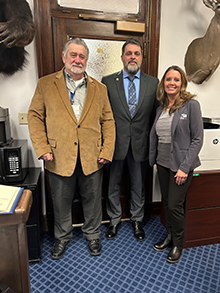
Last week, CEO Matthews and Director Hess attended the Alaska Power Association State Legislative Conference in Juneau, Alaska. While there, they engaged with legislators, heard from our federal delegation, listened to panel discussions on statewide energy priorities, and had one-on-one meetings with Representative George Rauscher, Representative Becky Schwanke, Senator Mike Cronk, and Senator Mike Shower.
With just two weeks into the session, legislators have hit the ground running. Several members of the House Energy Committee took part in panel discussions that focused on key energy priorities for the state. Topics included in various presentations and conversations throughout the week frequently included gas supply, the Renewable Energy Fund, and financial constraints facing the state.
Senator Lisa Murkowski, Senator Dan Sullivan, and Representative Nick Begich addressed attendees via video, highlighting efforts to ease regulatory burdens, particularly on hydro projects. They also discussed the new administration’s focus on energy development and Alaska’s potential role in shaping the future with its diverse energy resources.
Advocating for our members remains a strategic priority for Copper Valley Electric. During their meetings, Matthews and Hess addressed critical challenges facing the co-op, to include the increasing costs of environmental and regulatory burdens, high cost of fuel, and the high cost of replacing aging infrastructure.
CEO Matthews also provided updates on current and potential future projects, including: the CVEA/Alyeska Intertie, Solomon Gulch Dam Raise, Tiekel Hydro Project, and the co-op's investment in system maintenance to increase reliability. Finally, the team voiced CVEA's support on a variety of statewide efforts.
Pictured above: CEO Matthews and Director Hess with Representatives George Rauscher, Senator Mike Shower, and Senator Mike Cronk
CEO, Matthews, Attended the Alaska Power Association Federal Legislative Conference in June
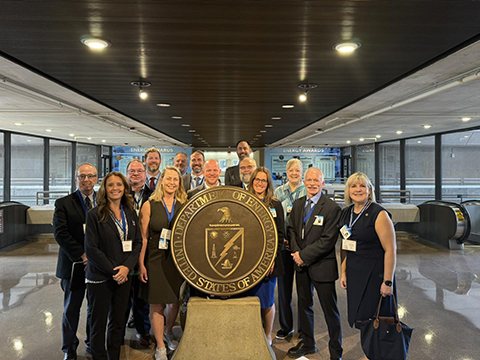
See complete conference summary and trip report provided by APA Deputy Director, Michael Rovito.
Matthews Advocates on Behalf of Members in Washington, D.C.


CEO, Jaime Matthews, recently traveled to Washington, D.C. with Alaska Power Association Executive Director, Crystal Enkvist, and lobbyist, Larry Markley. They met with the Alaska Congressional Delegation and Jerry Moses, State and Federal Relations Director for the Office of Governor Mike Dunleavy.
Matthews highlighted issues affecting CVEA, including the high cost of winter energy and increasing costs of environmental and regulatory burdens, and provided updates on important projects, including the CVEA/Alyeska Intertie and the close of the micro-modular nuclear reactor project review for CVEA's service territory. She also voiced the the cooperative's support on a variety of statewide efforts. The group rounded out productive meetings on Capitol Hill with Hannah Hardin, Senior Manager of Legislative Affairs for the National Rural Electric Cooperative Association.
CEO, Jaime Matthews, Visits Juneau
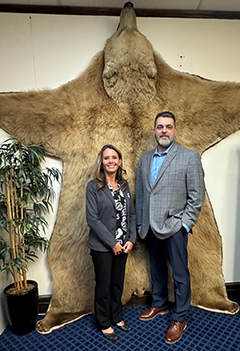
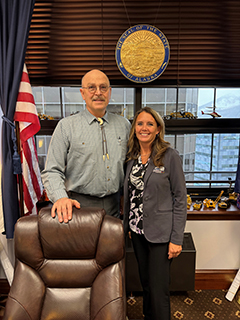
Advocating for members is a strategic priority for Copper Valley Electric. As part of the Cooperative's 2024 legislative advocacy efforts, CVEA CEO, Jaime Matthews, recently visited Juneau to meet with Representative George Rauscher, Representative Mike Cronk, Senator Click Bishop, and Senator Mike Shower.
During her visits, she discussed the biggest issues facing the co-op to include high winter power rates, increasing costs of environmental and regulatory burdens, and the high cost of replacing aging infrastructure. She also provided updates on current and potential future projects. Keeping representatives up-to-date on the issues and priorities of the Cooperative is critical to ensuring their understanding and support.
Pictured above: CEO Matthews with Representative Mike Cronk and Senator Click Bishop
2024 APA Legislative Fly-In Summary - Juneau, AK
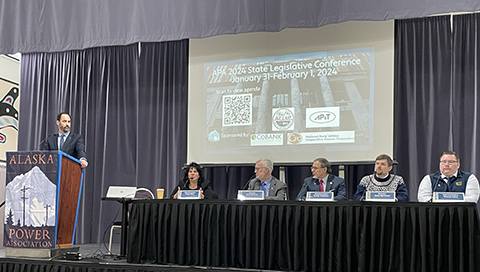
Sharon Scheidt, CVEA Director of Communications, joined electric industry professionals from all corners of the state, in Juneau, for the annual Alaska Power Association (APA) Legislative Fly-In January 31 through February 1. Throughout the event, the co-op participated in legislative briefings, presentations, panel discussions, and one-on-one meetings with legislators and staff members. The goal of the visit was to learn about the current legislative session and discuss CVEA issues and priorities.